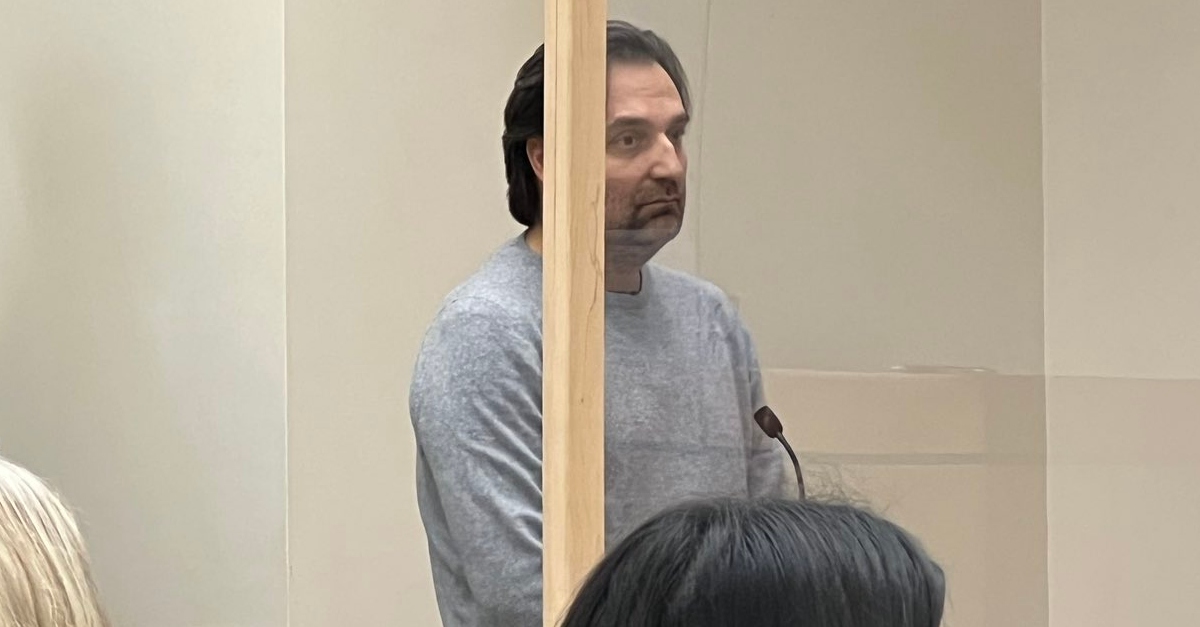
Brian Walshe in court for his arraignment on Jan. 18, 2023. Prosecutors just charged him with murdering wife Ana Walshe. (Image via Sierra Gillespie)
Brian Walshe, the man charged with murdering wife Ana Walshe, made a slew of incriminating internet searches and was allegedly seen on surveillance footage throwing away evidence in several dumpsters, a prosecutor said in his arraignment on Wednesday.
Though trash collectors unwittingly took away some of that evidence for shredding and incineration, investigators claim to have gotten items from a dumpster near the home of Brian’s mother in Swampscott, Massachusetts. Recovered items from 10 trash bags included slippers and a suit that tested positive for both the wife and husband’s blood, the prosecutor said. There were also boots and a purse consistent with what Brian claimed Ana was wearing when he supposedly last saw her.
Investigators claimed to have also found a partial necklace consistent with jewelry Ana wore in photographs. Other items included cleaning supplies like towels, rags, tape, gloves, cleaning agents, carpets, a hatchet, a hacksaw, and a COVID-19 vaccine card in Ana’s name, the prosecutor said.
As previously reported, the husband allegedly said he last saw his wife early New Year’s Day and that she left their home in Cohasset because there was a work emergency at her job in Washington, D.C. Brian said he last saw Ana at approximately 6 a.m., the prosecutor claimed. But the state read out 14 suspicious internet searches that the husband allegedly wrote from 4:55 a.m. to 1:21 p.m. on Jan 1. That included:
- “How long before a body starts to smell?”
- “How to stop a body from decomposing?”
- “10 ways to dispose of a dead body if you really need to.”
- “How long for somebody to be missing to inherit.”
- “Can you throw away body parts?”
- “Is it better to throw crime scene clothes away or wash them?”
- “Dismemberment and the best ways to dispose of a body.”
Other searches concerned whether partial remains can be identified, cleaning blood from a wooden floor, and chemicals like the preservative formaldehyde and blood-detection tool luminol, prosecutors alleged.
Authorities say it was Ana’s employer, not her husband, who called in a welfare check after she did not show up to work on Jan. 4. It was only when cops arrived at the couple’s home that Brian allegedly reported her missing. The couple had three sons , ages 2, 4, and 6.
Brian’s alleged searches continued after New Year’s Day. On Jan. 2, he searched things like “Hacksaw best tool to dismember” and “Can you identify a body with broken teeth?” according to the prosecutor.
There was also: “Can you be charged with murder without a body?”
Authorities did not say anything about finding Ana’s body, only evidence with her blood on it. They said they found no activity from her cards since her disappearance. But yes, prosecutors have won homicide convictions without bodies, though it can be a tougher fight in court.
Consider Patrick Frazee, convicted in Colorado for murdering fiancée Kelsey Berreth; his ex-girlfriend testified about helping him clean up. In Florida, Luis Toledo was convicted in 2017 of murdering his wife Yessenia Suarez, and her children, 8-year-old Michael Otto and 9-year-old Thalia Otto. A neighbor testified about Toledo deceiving him into helping cleaning up the evidence while keeping him in the dark about the killings. Investigators have not found Yessenia’s or her children’s bodies, Volusia County Sheriff’s spokesman Andrew Gant told Law&Crime on Tuesday.
Prosecutors say that when police arrived at Walshe’s home on January 4, they noted the backseat of his car was down with a plastic liner. Further search of the car found blood inside.
— Sierra Gillespie (@sierragillespie) January 18, 2023
In Walshe’s case, investigators are citing his internet search history, cell phone location data, and surveillance footage. For example, video showed his Volvo and a man matching his appearance at places like Abington, Massachusetts, the prosecutor said. Footage from Jan. 3 allegedly showed this individual throwing away a garbage bag, which appeared to be heavy because he was leaning.
“What happens to hair on a dead body?” Brian Walshe allegedly wrote that day.
As previously alleged, Walshe allegedly spent $450 in cleaning supplies on Jan. 2 at a Home Depot in Rockland, Massachusetts. Having been on house arrest after pleading guilty in a fraud case, he allegedly was not allowed to be in Abington.
Two other alleged internet searches from Jan. 3 were: “What is the rate of decomposition of a body found in a plastic bag compared to on a surface in the woods?” and “Can baking soda make a body smell good?”
Brian Walshe is being held without bail pending indictment, the judge decided.
Update: Walshe’s attorney Tracy Miner released a statement.
“It is easy to charge a crime and even easier to say a person committed that crime,” she wrote. “It is a much more difficult thing to prove it, which we will see if the prosecution can do. I am not going to comment on the evidence, first because I am going to try this case in the court and not in the media. Second, because I haven’t been provided with any evidence by the prosecution. In my experience, where, as here, the prosecution leaks so called evidence to the press before they provide it to me, their case isn’t that strong.”
This is an apparent reference to earlier media coverage citing law enforcement sources who spoke on background. For example, CNN previously cited law enforcement sources regarding Brian Walshe allegedly looking up how to dismember and get rid of a body.
“When they have a strong case, they give me everything as soon as possible,” Miner wrote. “We shall see what they have and what evidence is admissible in court, where the case will ultimately be decided.”